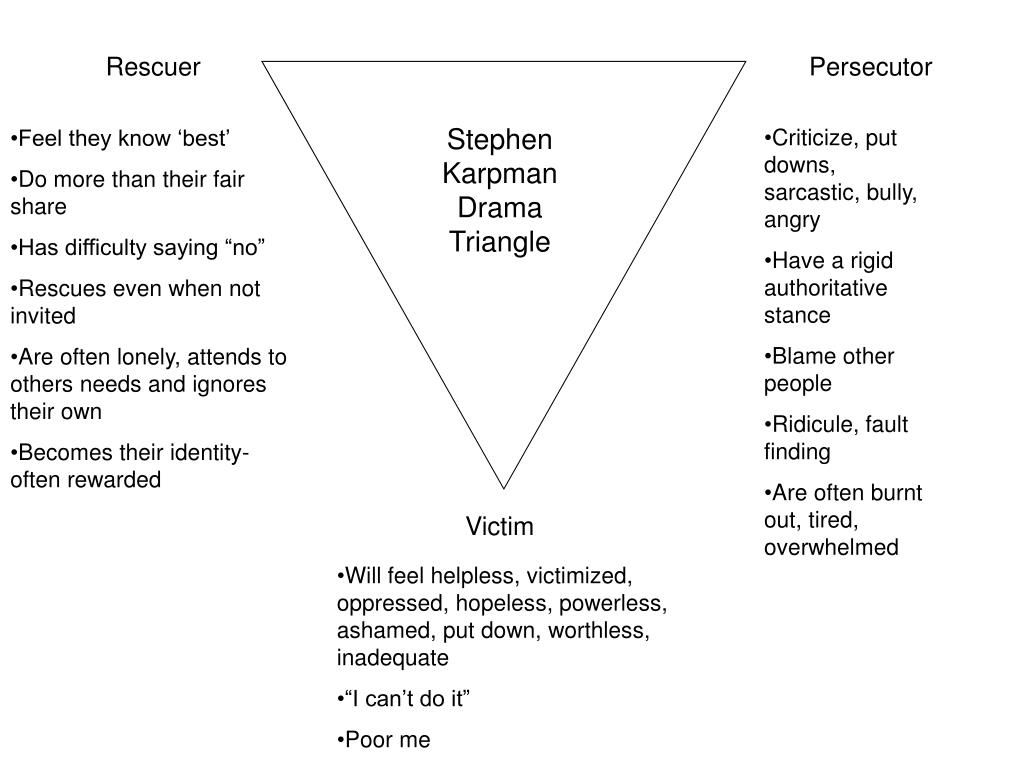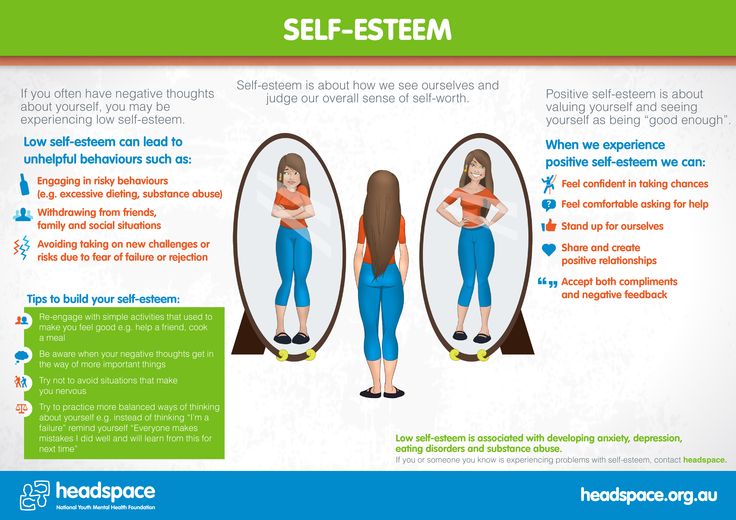Impostor syndrome women
Doctor explains how women can overcome imposter syndrome
In a recent coaching conversation, a superbly talented young female executive told me that she was racked by the fear of being ‘found out’ for not having the talent and skills that had contributed to her recent promotion. ‘I have imposter syndrome,’ she said.
Our pre-disposition as humans to label and categorise the world generally helps us to navigate it successfully. But there are also times when the easy way backfires. Imposter syndrome is one such label, frequently used, but thoroughly unhelpful. Psychologising common experiences leads to ‘blaming the victim’ and failure to address broader cultural and systemic causation.
Imposter syndrome is so common, even having a certain cachet, yet before you choose to use it again, you need to know this:
- There is no such thing as imposter syndrome; it is not a psychological condition or diagnosis.
- Feeling like an imposter is a common experience that according to the American Psychological Association up to 82 per cent of people feel.
From time to time, pretty much all of us have doubts about our worthiness, our legitimacy, or feel undeserving of success.
- Feeling like an imposter is more prevalent among women and minorities, and we need to understand why.
None of this means that the young executive didn’t feel what she felt, because she did. What it does mean is that by taking her context into account, there were different, more powerful ways to label her experience and improve how she felt about herself and her success.
No such thing as imposter syndrome
Melis Muradoglu and Andrei Cimpian pick up the research started by Pauline Rose Clance and Suzanne Imes in the 1970s when they first named imposter phenomenon:
‘Bright, capable, accomplished women who doubt they have earned their success, who feel that their success and achievements are a result of luck. They are concerned that this will be discovered and they will be outed as an imposter.’
It’s noteworthy that the original researchers didn’t call it a syndrome but a phenomenon – but we just love a label!
What’s much more powerful is to contextualise what is happening.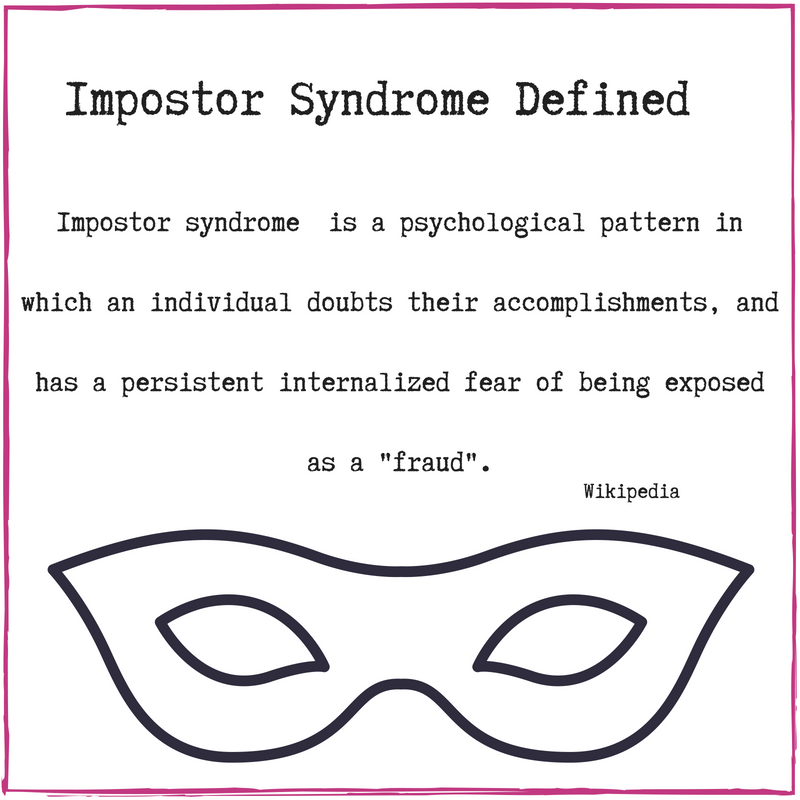 Feeling like an imposter is for many women linked to identity threat – it is more prevalent in contexts that are inhospitable to women, and where gender stereotypes suggest that women don’t fit, or don’t have the same capabilities as men. Identity threat results in feelings of exclusion and stigma.
Feeling like an imposter is for many women linked to identity threat – it is more prevalent in contexts that are inhospitable to women, and where gender stereotypes suggest that women don’t fit, or don’t have the same capabilities as men. Identity threat results in feelings of exclusion and stigma.
Muradoglu and Cimpian’s study showed that gender differences in imposter feelings were larger when ‘brilliance’ – innate talent – was seen as critical for success. Women felt less valued and accepted, and more disrespected, in their fields. Those effects were exacerbated for minority women. Women also felt less likely to succeed in the future.
When it feels like it’s ‘man’s world’, women feel a lower level of interest and sense of belonging, as well as stronger imposter feelings. Other research shows that when the context is altered to be more welcoming and less competitive, gender gaps in interest and belonging reverse.
How to reduce imposter feelings
To make women and minorities more welcome in your occupation, discipline or organisation, consider how you define success. Treating talent as innate and focusing on brilliance as necessary to success, can raise the likelihood of imposter feelings. This means redefining success in more inclusive ways.
Treating talent as innate and focusing on brilliance as necessary to success, can raise the likelihood of imposter feelings. This means redefining success in more inclusive ways.
Competitiveness, aggression and independence are related to increased imposter feelings so check your language, and balance it with cooperation, support and collegiality.
Ensure there are diverse role models, and make them visible.
When people share their experience as an imposter, you can validate their feelings and then help them to reframe them. Discover what would help them to feel more confident about their successes, and help to make contextual changes that will support them.
If you experience feeling like an imposter:
- Work on shifting your own experience. Get out of your own head, understand how your context affects how you see yourself, and remind yourself of your past success.
- Advocate, as you can, for change in how your context, and success in your context, is defined.

- Recognise that, given your success, others don’t see you as a fraud. Use mentors, colleagues and friends to help you remind yourself of your capabilities and successes.
- Do the same for others, as that also helps recognise and remind you of your own success.
In summary, let’s stop using the term imposter syndrome, and look for alternative explanations for the experience of these feelings. Given their prevalence among women and minorities, consider the possible contextual and systemic conditions that give rise to such common feelings.
When we do that, it’s possible to identify actions that prevent people from feeling like imposters, help them reframe what’s happening when they do, and identify actions that will help people to claim and appreciate their successes.
Karen Morley is a distinguished executive coach, an authority on leadership coaching and a thought leader on inclusive leadership. She is the author of FlexAbility: how high achievers beat burnout and find freedom in an overworked world, Beat Gender Bias, Lead Like a Coach, and Gender-Balanced Leadership.
Stop Telling Women They Have Imposter Syndrome
Leer en español
Ler em português
Talisa Lavarry was exhausted. She had led the charge at her corporate-event-management company to plan a high-profile, security-intensive event, working around the clock and through weekends for months. Barack Obama was the keynote speaker.
Lavarry knew how to handle the complicated logistics required — but not the office politics. A golden opportunity to prove her expertise had turned into a living nightmare. Lavarry’s colleagues interrogated and censured her, calling her professionalism into question. Their bullying, both subtle and overt, haunted each decision she made. Lavarry wondered whether her race had something to do with the way she was treated. She was, after all, the only Black woman on her team. She began doubting whether she was qualified for the job, despite constant praise from the client.
Things with her planning team became so acrimonious that Lavarry found herself demoted from lead to colead and was eventually unacknowledged altogether by her colleagues. Each action that chipped away at her role in her work doubly chipped away at her confidence. She became plagued by deep anxiety, self-hatred, and the feeling that she was a fraud.
Each action that chipped away at her role in her work doubly chipped away at her confidence. She became plagued by deep anxiety, self-hatred, and the feeling that she was a fraud.
What had started as healthy nervousness — Will I fit in? Will my colleagues like me? Can I do good work? — became a workplace-induced trauma that had her contemplating suicide.
Today, when Lavarry, who has since written a book about her experience, Confessions From Your Token Black Colleague, reflects on the imposter syndrome she fell prey to during that time, she knows it wasn’t a lack of self-confidence that held her back. It was repeatedly facing systemic racism and bias.
Examining Imposter Syndrome as We Know It
Imposter syndrome is loosely defined as doubting your abilities and feeling like a fraud. It disproportionately affects high-achieving people, who find it difficult to accept their accomplishments. Many question whether they’re deserving of accolades.
Psychologists Pauline Rose Clance and Suzanne Imes developed the concept, originally termed “imposter phenomenon,” in their 1978 founding study, which focused on high-achieving women. They posited that “despite outstanding academic and professional accomplishments, women who experience the imposter phenomenon persist in believing that they are really not bright and have fooled anyone who thinks otherwise.” Their findings spurred decades of thought leadership, programs, and initiatives to address imposter syndrome in women. Even famous women — from Hollywood superstars such as Charlize Theron and Viola Davis to business leaders such as Sheryl Sandberg and even former First Lady Michelle Obama and Supreme Court Justice Sonia Sotomayor — have confessed to experiencing it. A Google search yields more than 5 million results and shows solutions ranging from attending conferences to reading books to reciting one’s accomplishments in front of a mirror. What’s less explored is why imposter syndrome exists in the first place and what role workplace systems play in fostering and exacerbating it in women. We think there’s room to question imposter syndrome as the reason women may be inclined to distrust their success.
They posited that “despite outstanding academic and professional accomplishments, women who experience the imposter phenomenon persist in believing that they are really not bright and have fooled anyone who thinks otherwise.” Their findings spurred decades of thought leadership, programs, and initiatives to address imposter syndrome in women. Even famous women — from Hollywood superstars such as Charlize Theron and Viola Davis to business leaders such as Sheryl Sandberg and even former First Lady Michelle Obama and Supreme Court Justice Sonia Sotomayor — have confessed to experiencing it. A Google search yields more than 5 million results and shows solutions ranging from attending conferences to reading books to reciting one’s accomplishments in front of a mirror. What’s less explored is why imposter syndrome exists in the first place and what role workplace systems play in fostering and exacerbating it in women. We think there’s room to question imposter syndrome as the reason women may be inclined to distrust their success.
Read more about
Mentoring Someone with Imposter Syndrome
The impact of systemic racism, classism, xenophobia, and other biases was categorically absent when the concept of imposter syndrome was developed. Many groups were excluded from the study, namely women of color and people of various income levels, genders, and professional backgrounds. Even as we know it today, imposter syndrome puts the blame on individuals, without accounting for the historical and cultural contexts that are foundational to how it manifests in both women of color and white women. Imposter syndrome directs our view toward fixing women at work instead of fixing the places where women work.
Feeling Unsure Shouldn’t Make You an Imposter
Imposter syndrome took a fairly universal feeling of discomfort, second-guessing, and mild anxiety in the workplace and pathologized it, especially for women. As white men progress, their feelings of doubt usually abate as their work and intelligence are validated over time. They’re able to find role models who are like them, and rarely (if ever) do others question their competence, contributions, or leadership style. Women experience the opposite. Rarely are we invited to a women’s career development conference where a session on “overcoming imposter syndrome” is not on the agenda.
They’re able to find role models who are like them, and rarely (if ever) do others question their competence, contributions, or leadership style. Women experience the opposite. Rarely are we invited to a women’s career development conference where a session on “overcoming imposter syndrome” is not on the agenda.
The label of imposter syndrome is a heavy load to bear. “Imposter” brings a tinge of criminal fraudulence to the feeling of simply being unsure or anxious about joining a new team or learning a new skill. Add to that the medical undertone of “syndrome,” which recalls the “female hysteria” diagnoses of the nineteenth century. Although feelings of uncertainty are an expected and normal part of professional life, women who experience them are deemed to suffer from imposter syndrome. Even if women demonstrate strength, ambition, and resilience, our daily battles with microaggressions, especially expectations and assumptions formed by stereotypes and racism, often push us down. Imposter syndrome as a concept fails to capture this dynamic and puts the onus on women to deal with the effects. Workplaces remain misdirected toward seeking individual solutions for issues disproportionately caused by systems of discrimination and abuses of power.
Imposter syndrome as a concept fails to capture this dynamic and puts the onus on women to deal with the effects. Workplaces remain misdirected toward seeking individual solutions for issues disproportionately caused by systems of discrimination and abuses of power.
Bias and Exclusion Exacerbate Feelings of Doubt
For women of color, self-doubt and the feeling that we don’t belong in corporate workplaces can be even more pronounced — not because women of color (a broad, imprecise categorization) have an innate deficiency but because the intersection of our race and gender often places us in a precarious position at work. Many of us across the world are implicitly, if not explicitly, told we don’t belong in white- and male-dominated workplaces. Half of the women of color surveyed by Working Mother Media plan to leave their jobs in the next two years, citing feelings of marginalization or disillusionment, which is consistent with our experiences. Exclusion that exacerbated self-doubt was a key reason for each of our transitions from corporate workplaces to entrepreneurship.
“Who is deemed ‘professional’ is an assessment process that’s culturally biased and skewed,” said Tina Opie, an associate professor at Babson College, in an interview last year. When employees from marginalized backgrounds try to hold themselves up to a standard that no one like them has met (and that they’re often not expected to be able to meet), the pressure to excel can become too much to bear. The once-engaged Latina woman suddenly becomes quiet in meetings. The Indian woman who was a sure shot for promotion gets vague feedback about lacking leadership presence. The trans woman who always spoke up doesn’t anymore because her manager makes gender-insensitive remarks. The Black woman whose questions once helped create better products for the organization doesn’t feel safe contributing feedback after being told she’s not a team player. For women of color, universal feelings of doubt become magnified by chronic battles with systemic bias and racism.
Women at Work
Resources, practical advice, and personal stories to lift you up and move you forward.
In truth, we don’t belong because we were never supposed to belong. Our presence in most of these spaces is a result of decades of grassroots activism and begrudgingly developed legislation. Academic institutions and corporations are still mired in the cultural inertia of the “good ol’ boys” clubs and white supremacy. Biased practices across institutions routinely stymie the ability of individuals from underrepresented groups to truly thrive.
The answer to overcoming imposter syndrome is not to fix individuals but to create an environment that fosters a variety of leadership styles and in which diverse racial, ethnic, and gender identities are seen as just as professional as the current model, which Opie describes as usually “Eurocentric, masculine, and heteronormative.”
Confidence Doesn’t Equal Competence
We often falsely equate confidence — most often, the type demonstrated by white male leaders — with competence and leadership. Employees who can’t (or won’t) conform to male-biased social styles are told they have imposter syndrome. According to organizational psychologist Tomas Chamorro-Premuzic:
According to organizational psychologist Tomas Chamorro-Premuzic:
The truth of the matter is that pretty much anywhere in the world men tend to think that they are much smarter than women. Yet arrogance and overconfidence are inversely related to leadership talent — the ability to build and maintain high-performing teams, and to inspire followers to set aside their selfish agendas in order to work for the common interest of the group.
The same systems that reward confidence in male leaders, even if they’re incompetent, punish white women for lacking confidence, women of color for showing too much of it, and all women for demonstrating it in a way that’s deemed unacceptable. These biases are insidious and complex and stem from narrow definitions of acceptable behavior drawn from white male models of leadership. Research from Kecia M. Thomas finds that too often women of color enter their companies as “pets” but are treated as threats once they gain influence in their roles. Women of color are by no means a monolith, but we are often linked by our common experiences of navigating stereotypes that hold us back from reaching our full potential.
Women of color are by no means a monolith, but we are often linked by our common experiences of navigating stereotypes that hold us back from reaching our full potential.
Fixing Bias, Not Women
Imposter syndrome is especially prevalent in biased, toxic cultures that value individualism and overwork. Yet the “fix women’s imposter syndrome” narrative has persisted, decade after decade. We see inclusive workplaces as a multivitamin that can ensure that women of color can thrive. Rather than focus on fixing imposter syndrome, professionals whose identities have been marginalized and discriminated against must experience a cultural shift writ large.
Leaders must create a culture for women and people of color that addresses systemic bias and racism. Only by doing so can we reduce the experiences that culminate in so-called imposter syndrome among employees from marginalized communities — or at the very least, help those employees channel healthy self-doubt into positive motivation, which is best fostered within a supportive work culture.
Perhaps then we can stop misdiagnosing women with “imposter syndrome” once and for all.
Imposter syndrome: why do women devalue their successes?
Manshuq author Nailya Galeeva tried to figure out where the roots of the problem called “impostor syndrome” are. And at the same time I talked with successful women who have repeatedly experienced doubts about their professionalism.
Nailya Galeeva
June 2, 2022
The term "Imposter Syndrome" first appeared in an article by Pauline Clans and Suzanne Imes titled "Imposter Syndrome in Highly Achieved Women: Dynamics and Therapeutic Intervention". The article was published at 1978, just in the second wave of feminism, when women began to fight for equality, not only from a legal point of view, but also to demand more rights to participate in political life. And then it became clear how many women considered themselves not smart enough and simply unworthy to live in the "man's world. "
"
Well, according to Klance and Susannah Imes, the impostor syndrome is "an internal sense of doubt about one's intellectual abilities, which is especially common among women with a high level of achievement." Simply put, we are afraid that we are about to be exposed and show how small and stupid we are. By the way, while preparing the article, the researchers conducted individual and group psychotherapeutic work with 150 women. They were distinguished by academic and personal achievements, but admitted that they felt as if they were occupying someone else's place. nine0003
And there is a good historical reason for this feeling. After World War II, the US government faced a difficult choice: men returned from the front, and their jobs were taken by women who saved the country's economy. And they did it very successfully, I must say. So how do you get women out of these jobs? To hammer into their heads a beautiful myth that post-war America needs lovely housewives in clean aprons and with perfect styling. And for those who did not want to play by the rules, public condemnation and a generally hard life awaited. You can read more about this period in the wonderful study by Betty Friedan, The Feminine Mystery. nine0003
And for those who did not want to play by the rules, public condemnation and a generally hard life awaited. You can read more about this period in the wonderful study by Betty Friedan, The Feminine Mystery. nine0003
That is, in many ways, the impostor syndrome is formed by the attitude of men towards women in responsible (and not so) positions - they seem to occupy a place that is not due to them in terms of rank. Here's the kitchen and laundry room, please. And billion-dollar corporations - no, my dear, you won’t pull it, you will break, and you also suffer from PMS and live with hormones. But you never know what women hear when applying for a job or already in the process. It takes nerves of steel.
Of course, men also experience impostor syndrome. So, in a study of American scientists in 2015, 345 women and 146 men took part, and there was no particular difference between different genders. Both of them were prone to impostor syndrome. However, the ancestor of the term herself wrote that men also experience the syndrome, they just prefer to talk about it in anonymous surveys and less often resort to the help of a psychologist than women. And Harvard psychologist Amy Cuddy said she received thousands of emails after her TED Talk, about half of them from men who admitted they felt like impostors. nine0003
And Harvard psychologist Amy Cuddy said she received thousands of emails after her TED Talk, about half of them from men who admitted they felt like impostors. nine0003
One recent study suggests that people with impostor syndrome are better at work and have good social skills. Dissatisfaction with oneself leads to the fact that employees make more efforts in working with clients and in the work process in general. This conclusion was made by behavioral psychologists from the Massachusetts Institute of Technology. Now that we've got some terminology out of the way, it's time to listen to successful women who experience impostor syndrome despite their accomplishments. nine0003
Dana Akylbekova
scientist and co-founder of Medsupportkz:
“Women often experience impostor syndrome, perhaps because the higher you climb the corporate ladder, the fewer women you meet. And that means fewer role models to follow. And very often (especially in Kazakhstan) others question the competence, contribution or leadership style of women. For example, people always ask me how it happened that I am a professor, or they say that there are no such professors. I was told in plain text not to call myself that. I doubt very much that such a thing is written or said to a young male professor. nine0003
For example, people always ask me how it happened that I am a professor, or they say that there are no such professors. I was told in plain text not to call myself that. I doubt very much that such a thing is written or said to a young male professor. nine0003
Daily battles with micro-aggressions, especially with expectations and stereotypes, can unbalance even the strongest and most ambitious women.
Gender systemic inequality makes women constantly doubt themselves
The patriarchal system praises men for their confidence, even if they are not competent in this matter, and at the same time scolds women if they are confident. At the same time, women get it for self-doubt - then they are called impostors. nine0003
I think the fight against this syndrome is not about women's training, where women are taught to be more confident in themselves and put all the blame on them. This struggle is about changing the patriarchal system itself. We need to change the culture in the workplace, and not teach women to behave in a special way at work. What does it mean to change culture? Strive for gender balance, create conditions for mothers, introduce zero tolerance for any manifestations of harassment and provide training for managers on how to create an environment in which there is a place for diversity in all areas of work and where this diversity is encouraged. nine0003
We need to change the culture in the workplace, and not teach women to behave in a special way at work. What does it mean to change culture? Strive for gender balance, create conditions for mothers, introduce zero tolerance for any manifestations of harassment and provide training for managers on how to create an environment in which there is a place for diversity in all areas of work and where this diversity is encouraged. nine0003
I first experienced impostor syndrome during the coronavirus lockdown. Due to isolation from my colleagues, students and the inability to work in the laboratory, I stopped feeling satisfied with my work, felt that I was useful, part of the faculty, and for the first time began to doubt myself and my abilities. A psychologist helped me deal with impostor syndrome. I realized that the reason is not in me, but in poor management and management communication. My work was not properly evaluated, I was not included in the life of the department and in the decision-making processes during the coronavirus. These were objective facts, which I then openly expressed to the leadership. It also helps me to compare myself now with the previous version. I see that I have grown, I see my concrete achievements. nine0003
These were objective facts, which I then openly expressed to the leadership. It also helps me to compare myself now with the previous version. I see that I have grown, I see my concrete achievements. nine0003
If I have worked hard and well and have results, what kind of impostor syndrome can we talk about?
Now the responsibility lies with us - working women. Our task is to be role models, support other women, create conditions where they will not feel like impostors. With any gender discrimination, talk about it loudly and condemn it. Stand up for your rights and seek equal representation of women. Only by creating an environment and setting an example, we will be able to grow strong and self-confident women. The solution to impostor syndrome is not to fix individuals (especially women), but to create an environment that encourages different leadership styles and that takes into account racial, ethnic and gender identities.” nine0003
Maria Kim
personal stylist:
“Daily multitasking and a considerable number of responsibilities assigned to a woman play, in my opinion, a crucial role in the formation of the impostor syndrome. A woman must be a loving wife, a good mother, an excellent housewife, look beautiful and young and take proper care of herself, keep fit and do fitness, and also be sure to fulfill herself, be interesting, smart and successful. And if suddenly in some of the obligations imposed on a woman once and by someone she has an omission (and almost every woman has it), then a flurry of criticism from others falls on the unfortunate woman: she couldn’t, she couldn’t, she was lazy, unworthy, wrong. And when, at the cost of a crazy race, a woman still copes with a swarm of tasks and obligations, she involuntarily begins to feel the same impostor syndrome, because the echo of criticism and condemnation is so close, and it’s very easy to fall into their trap: she succeeded in one, missed and lost in another. nine0003
A woman must be a loving wife, a good mother, an excellent housewife, look beautiful and young and take proper care of herself, keep fit and do fitness, and also be sure to fulfill herself, be interesting, smart and successful. And if suddenly in some of the obligations imposed on a woman once and by someone she has an omission (and almost every woman has it), then a flurry of criticism from others falls on the unfortunate woman: she couldn’t, she couldn’t, she was lazy, unworthy, wrong. And when, at the cost of a crazy race, a woman still copes with a swarm of tasks and obligations, she involuntarily begins to feel the same impostor syndrome, because the echo of criticism and condemnation is so close, and it’s very easy to fall into their trap: she succeeded in one, missed and lost in another. nine0003
The first time I felt the impostor syndrome was when I started to realize myself as a stylist, being a mother of three small children. It was not easy for me to go to the goal, but I still cannot appreciate my success today. However, I work on it every day. To cope with impostor syndrome, I write down my progress every day, small and big. Even banal ones: I cooked breakfast, compiled a shopping list or style book for a client, took and picked up children from circles and sections. So I do not devalue my work and it is easier for me to go to the goal. nine0003
However, I work on it every day. To cope with impostor syndrome, I write down my progress every day, small and big. Even banal ones: I cooked breakfast, compiled a shopping list or style book for a client, took and picked up children from circles and sections. So I do not devalue my work and it is easier for me to go to the goal. nine0003
Every day I try to tell my daughters to listen and hear themselves. If you want to draw, draw. If you want to dance, dance. If you don’t want to do homework now, take a break, do what you like, and then return to the lessons. I don't make them clean the nursery. They will remove it when they themselves notice that it is uncomfortable for them to play and practice in a mess. I never blame them. And I always give the right to choose, even if I don’t like it.”
Maral Zeyltaeva
director of the regional office of ALSECO JSC:
“From time immemorial, the role of a woman has been to create a family hearth, give birth to children and raise them.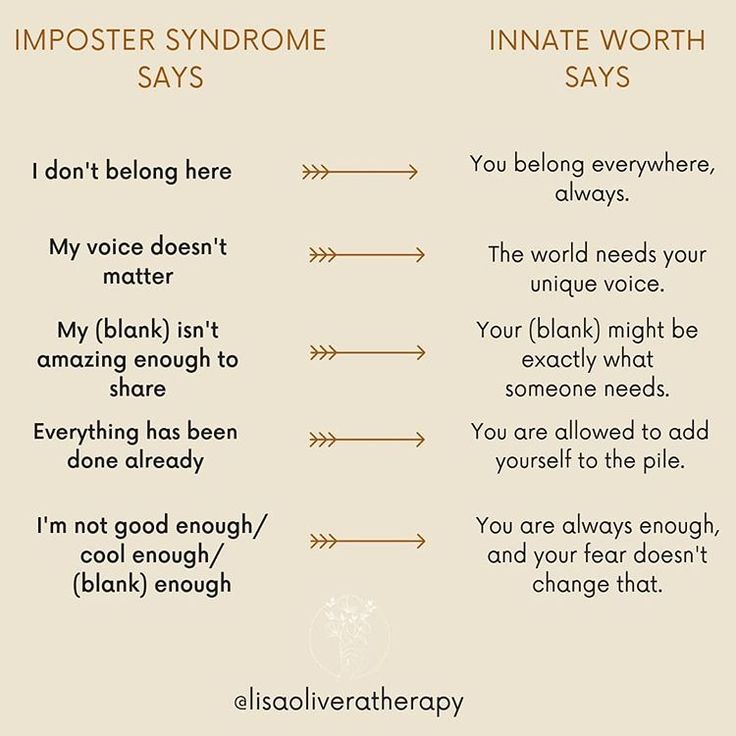 Perhaps that is why in the past most of the women in our country mostly devoted themselves to family and everyday life. Now the situation, I believe, has changed, and you can often meet women who are in business or occupy a leadership position, while doing well both in everyday life and in raising children.
Perhaps that is why in the past most of the women in our country mostly devoted themselves to family and everyday life. Now the situation, I believe, has changed, and you can often meet women who are in business or occupy a leadership position, while doing well both in everyday life and in raising children.
I began to feel the impostor syndrome as soon as responsible strategically important issues related to the company's activities and projects fell on my shoulders. It always seemed to me that such issues are better solved by men. But as soon as I begin to doubt my abilities or consider that I am undeservedly here, I begin to sort through in my head all my merits, successful projects, decisions that helped bring projects to a new level. Another option is to look at your own resume to remember the path that brought you to where you are. nine0003
In order for future generations of girls not to doubt their abilities, first of all I would advise parents not to divide everything in the world into female and male.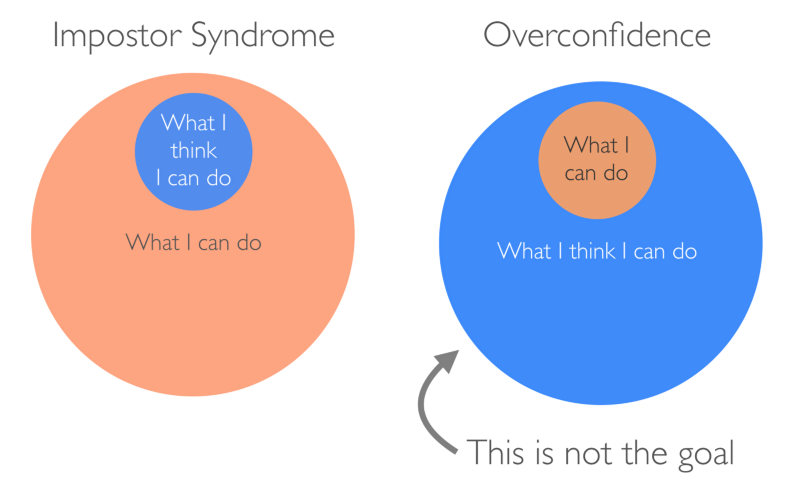 Secondly, listen to the child and listen to his desires. Thirdly, to praise, moreover, in essence, instilling confidence.
Secondly, listen to the child and listen to his desires. Thirdly, to praise, moreover, in essence, instilling confidence.
Arailym Abilgalimova
developer in an international company:
“I think women often experience impostor syndrome because we are more likely to discount our work and accomplishments. After all, only the last few generations a woman can combine work and family, but still, for many, the main and main role remains the creation of comfort, the upbringing of children. Maybe that's why women's success at work and in school is often viewed as an accident, not a pattern. Unfortunately, sometimes I hear how in some families girls are told that their main task when they grow up is to be able to create comfort. That is, they are programmed in advance that they are not capable of more. nine0003
I first experienced impostor syndrome when I returned to work after my second maternity leave.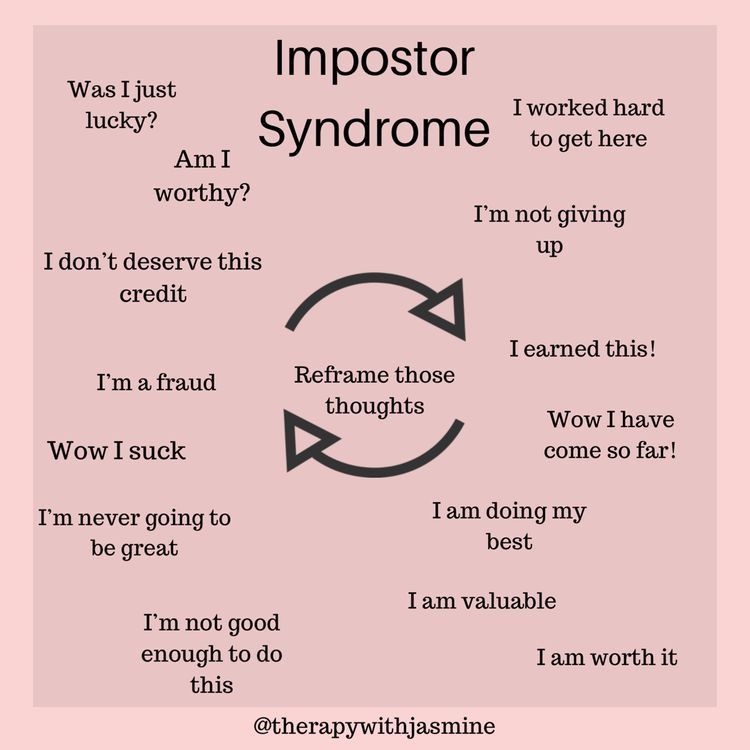 I had a feeling that I had missed a lot, that during this time I had become incompetent. I attributed all my successes to mere chance. It was hard to come up with and promote my ideas because I wasn't sure about them. Since I work in a male team, I constantly thought that now I can’t keep up with my colleagues, because I won’t be able to devote the same amount of time to the profession as they do - now I have household chores and children. nine0003
I had a feeling that I had missed a lot, that during this time I had become incompetent. I attributed all my successes to mere chance. It was hard to come up with and promote my ideas because I wasn't sure about them. Since I work in a male team, I constantly thought that now I can’t keep up with my colleagues, because I won’t be able to devote the same amount of time to the profession as they do - now I have household chores and children. nine0003
I was surprised by any incentives from the employer
There was even one case where we received feedback from clients, including one I worked with. At that moment I had an idea that there would be a bad review about my work, but in the end I got great feedback, the client liked the experience of working with me. Now I still have such thoughts, but much less often, as there have been quite large successes.
I recently learned that the condition I was experiencing has a name - the impostor syndrome. I accidentally stumbled upon an article, and then I began to study this topic more deeply, I especially like listening to podcasts of psychologists. It is also interesting to listen and read people's stories, how they cope with this syndrome and how it has helped them in their lives and careers. These are the motivational stories that really help. nine0003
I accidentally stumbled upon an article, and then I began to study this topic more deeply, I especially like listening to podcasts of psychologists. It is also interesting to listen and read people's stories, how they cope with this syndrome and how it has helped them in their lives and careers. These are the motivational stories that really help. nine0003
How can this problem be avoided in future generations? I don't think you should compare your child to other children. It is important to praise him for any achievements and not focus on failures. It is necessary to educate in children the ability to praise themselves.
Cover: Aziza Kireeva
Photos: Pexels
what it is and how to get rid of it - SKB Kontur
The feeling of an overestimated personal contribution to the success of a particular business is a common condition among successful people. Psychologists call this the impostor syndrome. According to various studies, about 70% of people have encountered a similar problem at least once. nine0003
nine0003
What is impostor syndrome
Psychotherapists Pauline Clanes and Susan Imes were the first to talk about this phenomenon in 1978. They also coined the term "Imposter Syndrome", which describes a phenomenon in which successful people experience negative feelings about their own achievements - as if their work is undeservedly praised, and success is only the result of a fortunate combination of circumstances.
Imposter syndrome usually manifests itself in professional realization. It is experienced by people who have stepped over the initial career stage or have created a profitable business. nine0003
The impostor phenomenon hurts. It prevents you from rationally evaluating yourself and your own achievements, makes a person constantly nervous and afraid of being exposed.
The syndrome can also lead to other psychological and physiological problems - due to constant stress, our body produces a lot of cortisol, the stress hormone. The normal metabolism is disturbed, the cardiovascular system experiences a constant increased load.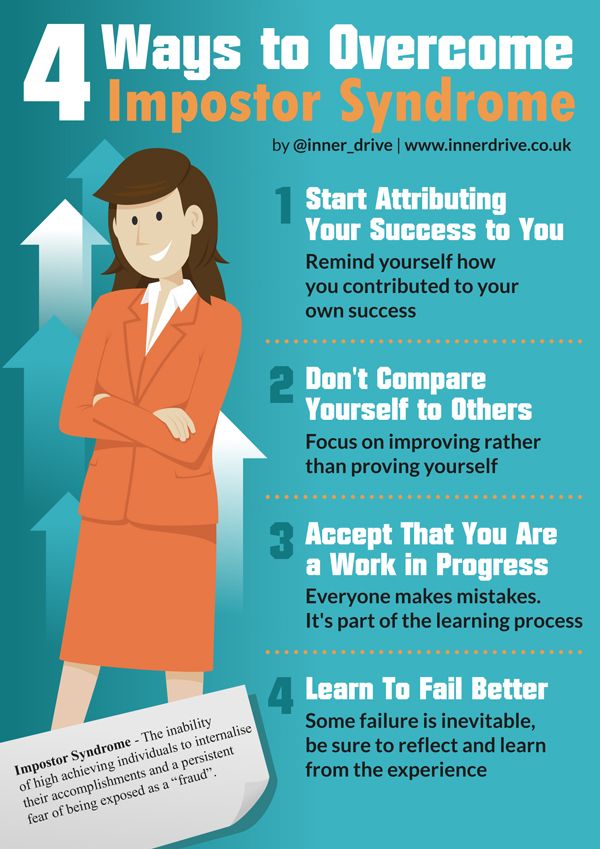 As a result, we can wind ourselves up to the “boiling point” and earn burnout, nervous breakdown, constant headache, heart problems and pressure. nine0003
As a result, we can wind ourselves up to the “boiling point” and earn burnout, nervous breakdown, constant headache, heart problems and pressure. nine0003
The impostor phenomenon weighs on self-esteem: we find ourselves in an endless race for success in order to get rid of feelings of fear and guilt, which become stronger with each new achievement.
How to Know if You Have Imposter Syndrome
There are a number of questions you can use to figure out what's going on with you.
- Do you ever feel insecure about yourself?
- Are you afraid of not meeting the expectations of your superiors, friends, relatives? nine0110
- When you are successful, do you find it difficult to praise yourself?
- If you achieve something, then anyone else can do it too?
- Is your success mainly due to external factors, luck and coincidence?
- If you analyze several goals that you set for yourself, will they turn out to be obviously unattainable?
- Do you think you succeeded by cheating? Can you articulate who you have deceived? nine0110
- Do you suffer from minor shortcomings in your business? Do you think that success is just doing the job without mistakes?
- Are you sure there are people who can rate you negatively?
- Do you have a fear that someone will show up and tell others that you are really a liar?
If you answered yes to most of the questions, then there is a good chance that you suffer from impostor syndrome.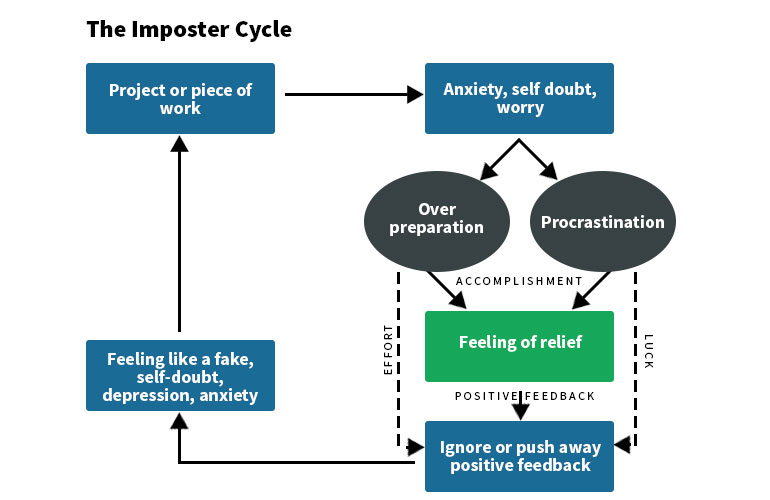 Especially if, according to objective criteria, you really achieved success. nine0003
Especially if, according to objective criteria, you really achieved success. nine0003
This is not an exhaustive list of questions that help to understand the presence of the impostor phenomenon in a particular person. If you need more accurate results, take a test or see a psychologist.
Causes of impostor syndrome
There is a cognitive distortion in psychology called the Dunning-Kruger effect. Its essence is that people with a low level of qualification do not have enough experience and competencies to objectively assess their abilities. Therefore, they are confident. nine0003
People with developed competencies are more likely to achieve real success, but at the same time they realize how many mistakes they made along the way. This leads to a decrease in self-confidence.
If we don't have some other psychological characteristics and difficulties with our own perception, then most likely there will be no problems - from time to time all successful people have a little doubt about their achievements and reflect on a large number of mistakes.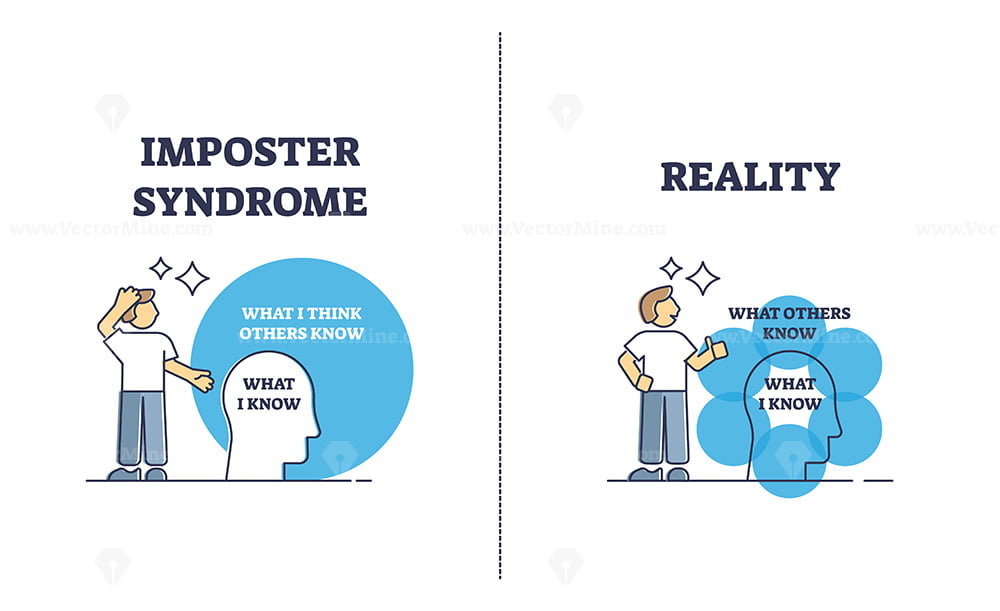 But if we experience some kind of internal conflict, then the Dunning-Kruger effect becomes the first step towards the development of the impostor syndrome. nine0141 That's what can cause the development of the phenomenon.
But if we experience some kind of internal conflict, then the Dunning-Kruger effect becomes the first step towards the development of the impostor syndrome. nine0141 That's what can cause the development of the phenomenon.
Unjustified expectations
People who are accustomed to quickly achieve success face such a problem. They pass the first steps in their careers without difficulty, intuitively. And subconsciously expect the same rapid development in the future.
When they realize that they cannot master a skill quickly, self-doubt appears.
Parental Expectations
Psychotherapists Pauline Clanes and Susan Imes found similar parenting patterns in women with impostor syndrome. As a rule, in childhood they were praised, talked about their outstanding abilities. nine0003
When they grow up and find that they have to work hard to achieve their goals, these women begin to feel guilty, as if they cannot live up to the expectations of their relatives.
Problems from childhood
Comparisons of a child in childhood with someone with age can cause psychological trauma and complexes. For example, this happens if we grow up with a smart brother or sister and then all our lives we try to prove that we are no worse than them.
The desire to be the best
Difficulties with self-esteem can gradually turn into a painful desire to always be a winner. Such a desire can develop due to special education, lack of love and praise, the impossibility of accepting oneself with shortcomings. nine0003
Usually such people study well and measure their success in grades. At work or in business, the usual system of coordinates is collapsing, there are no grades. They cannot comprehensively and independently evaluate themselves, therefore they begin to concentrate on shortcomings.
The result is ignoring strengths, emphasizing weaknesses, and concluding that you are an impostor and not worthy of praise.
Perfectionism
This is similar to the previous cause of the syndrome, it has a special name - the superman phenomenon. This is when people demand impeccability from themselves in all matters, set unrealistic goals and standards. They fail to achieve what they want, and then they begin to put pressure on themselves and are disappointed in life. nine0003
This is when people demand impeccability from themselves in all matters, set unrealistic goals and standards. They fail to achieve what they want, and then they begin to put pressure on themselves and are disappointed in life. nine0003
Fear of failure
This fear appears after the impostor syndrome, but it is also the cause of its intensification.
First, a person achieves some significant success in work or business. He rejoices at the achievements, but does not believe that this is the result of his labors. There is a fear that success will not be repeated, since there is a large share of luck in this.
In order to overcome the fear of failure, a person begins to work even harder, is in constant tension, which leads to burnout. nine0003
Reluctance to accept help
Such people prefer to become experts and always work alone. They have a prejudice about teamwork: they believe that accepting help means admitting incompetence.
External depreciation
When you often encounter distrust and negativity at work, regardless of the result of the work, then over time you begin to doubt yourself. For example, this happens in the case of gender problems, when a woman gets a job in a male team in a “male” position, works well, and her colleagues devalue her work and, if successful, say that she was just lucky. nine0003
For example, this happens in the case of gender problems, when a woman gets a job in a male team in a “male” position, works well, and her colleagues devalue her work and, if successful, say that she was just lucky. nine0003
Or another example: a novice but promising specialist is appointed a leader, and other managers do not accept him, envying his success. A person is constantly told that he is a bad worker. Since this is the first appointment and the newcomer is still doubting himself, he may develop impostor syndrome, even though he has achieved his goals.
We have an unspoken rule in the company: all managers grow from ordinary employees. When people become managers, you can see how many doubts they have: whether they are acting correctly, whether the boss regrets their appointment, whether they will be able to achieve their goals. nine0003
As a leader, I always share success with the team, any project is impossible without everyone's contribution to the common cause.
Such an approach is preventive work in order to save people from thoughts of imposture in advance.
For those who are faced with the syndrome, I can advise you to remember more often how much you have already done to get to where you are now. Resurrect in memory how many nights you did not sleep to come to such results, how much you studied, how many important decisions you made and how much work you poured into it. Your position was brought to you not by luck, but by the actions you implemented. nine0003
Alexander Bochkin , General Director of Infomaximum
Coping with impostor syndrome
Impostor syndrome is not considered a mental disorder and there is no specific treatment. But if it progresses, it becomes the cause of serious diseases. Therefore, it is better to start dealing with this problem in advance.
Watch your experiences and emotions
Try to put aside guilt for a while and not scold yourself.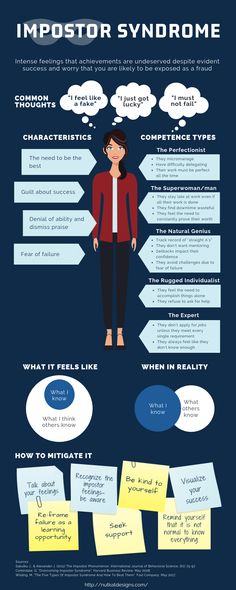 Do not try to convince yourself that some of your thoughts are delusions, just record their presence. nine0003
Do not try to convince yourself that some of your thoughts are delusions, just record their presence. nine0003
Imposter syndrome is usually the result of some self-esteem issues. Therefore, it is important not just to fight it, but to figure out what still forms negative feelings from success.
Start keeping a logbook of your anxieties and accomplishments. Every day for a month, just fix your thoughts, do not evaluate them.
Record answers to several questions. What supports my doubts about my competence? Is there anyone who considers me competent enough? Why do I think that my achievements do not belong to me? How are my doubts useful to me? Which of my experiences confirms my incompetence, and which refutes? Why am I valuable as a specialist? What makes me different from other professionals? nine0003
Write exactly with a pen on paper.
Olga Dyakonova , business psychologist, coach
Do not hide from your emotions
After analyzing your own state, you will learn not only to feel anxiety, but also to understand what specifically worries you. It could be insecurity, fear, shame, or something else. Don't berate yourself for these emotions, instead allow yourself to experience them.
It could be insecurity, fear, shame, or something else. Don't berate yourself for these emotions, instead allow yourself to experience them.
If you start getting angry at yourself, try redirecting that feeling to impostor syndrome. After all, it prevents you from living a full life. nine0003
Review your own successes
Imposter syndrome is usually career or business related: the person thinks they don't deserve to be successful or that they haven't achieved the level they need in a skill.
Explore your career or entrepreneurial path on your own or with the help of outside experts. Ask your manager and other recognized industry experts to review your skills, knowledge, and performance.
Try to avoid polarity, do not use "good" or "bad" ratings. Your task is to find out if you are capable of doing a particular job, solving certain problems. If so, use the results of this analysis the next time you experience impostor syndrome. If not, work with your manager and the experts involved to develop a realistic action plan to learn the skills you need. nine0003
nine0003
See a specialist
Imposter syndrome is a scientifically recognized psychological problem. If it prevents you from working, building communications and living a full life in general, it can be worked out with a specialist.
The origins of the impostor syndrome usually lie in childhood, it is the hyperpraise of parents, the cult of intelligence in the family, the constant comparison of the child with others or the devaluation of his choice. Psychologists and psychotherapists can help a person to explore his past, childhood. nine0003
It is better to consult a specialist as soon as the symptoms begin to interfere. It is difficult to answer the question of how many meetings with a psychologist are needed to solve the problem - it all depends on the traumatic experience in the past. The presence of trauma increases the time to achieve the goal, in order to work out the impostor syndrome and form a healthy self-worth, the client needs to live past experience, learn to cope with his feelings and emotions.






